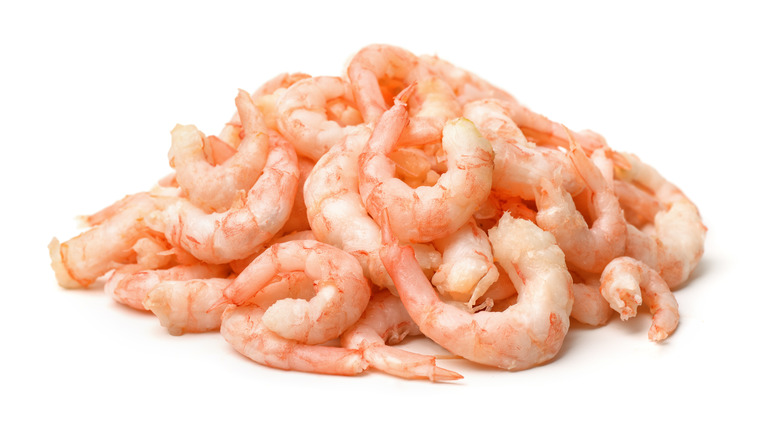Now, Your Canned Shrimp Is At Risk With The Latest Recall
In February 2023, Kawasho Foods recalled its Geisha medium shrimp, sold in 4 oz. cans. According to the FDA announcement, cans from the LGC12W12E22 lot were exhibiting signs of swelling, leaking, and even bursting, all of which can result from the product being under-processed. The affected cans in this lot were said to be distributed in four states: California, Arizona, Colorado, and Utah. As with any other canned goods, damage to the packaging leaves the product susceptible to spoilage or contamination. In this case, experts were concerned about an outbreak of Clostridium botulinum.
On April 21, 2023, Kawasho Foods expanded its recall to cover all lots of Geisha medium shrimp sold in 4 oz. cans with a UPC of 071140003909. The recall now affects 31 states: AL, AR, AZ, CA, CO, CT, DE, FL, GA, IA, IL, IN, KS, KY, MA, MI, MN, MO, NC, NH, NJ, NY, OH, OR, PA, TN, TX, UT, VA, WA, and WI. CBS claims that no one has reported any cases of food poisoning related to eating the shrimp. Regardless, the FDA recommends that all cans of Geisha shrimp be thrown out or returned to the store for a refund. Do not, under any circumstances, continue to eat another bite of this shrimp.
The dangers of Clostridium botulinum bacteria in food
While there's no way to know exactly how Kawasho Foods' Geisha shrimp was under-processed, be it from preservatives, cooking, packaging materials, or something else entirely, the result is the same — and that's the potential for serious illness.
As you might have guessed, Clostridium botulinum is the bacteria responsible for botulism. The CDC notes that although Clostridium botulinum spores are rarely dangerous to humans due to their protective coating, they can become dangerous when they grow in low-salt, low-sugar, low-acidity, anaerobic environments. Unfortunately, canned foods meet these conditions, especially if the packaging has been damaged so bacteria are able to get in.
According to the USDA, Clostridium botulinum bacteria attack the body's nervous system, causing symptoms like nausea and vertigo, visual impairment, lack of coordination, difficulty breathing, and if left untreated, can lead to death. Foodborne botulism symptoms usually start within 12 to 36 hours, per Mayo Clinic. This type of foodborne illness is classified as a medical emergency, so if you experience any symptoms after consuming food, seek medical attention immediately.

